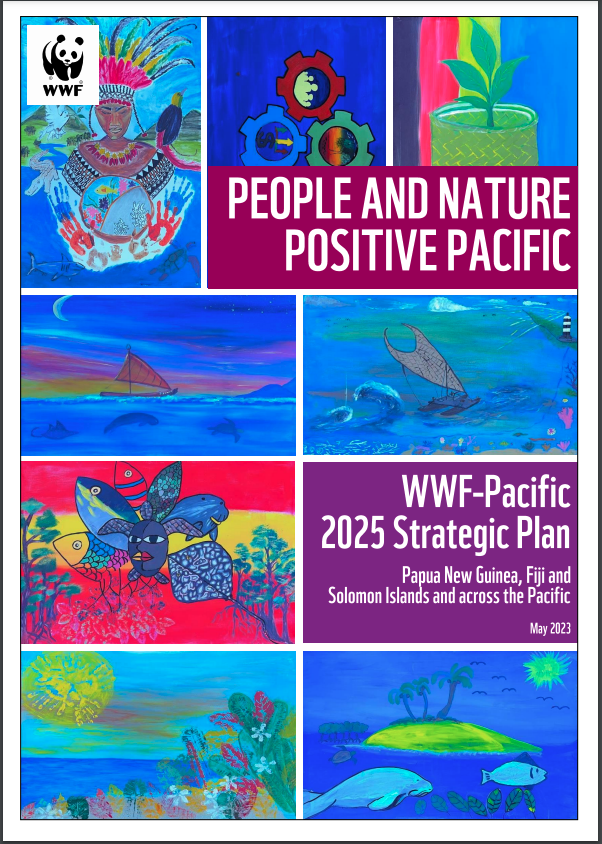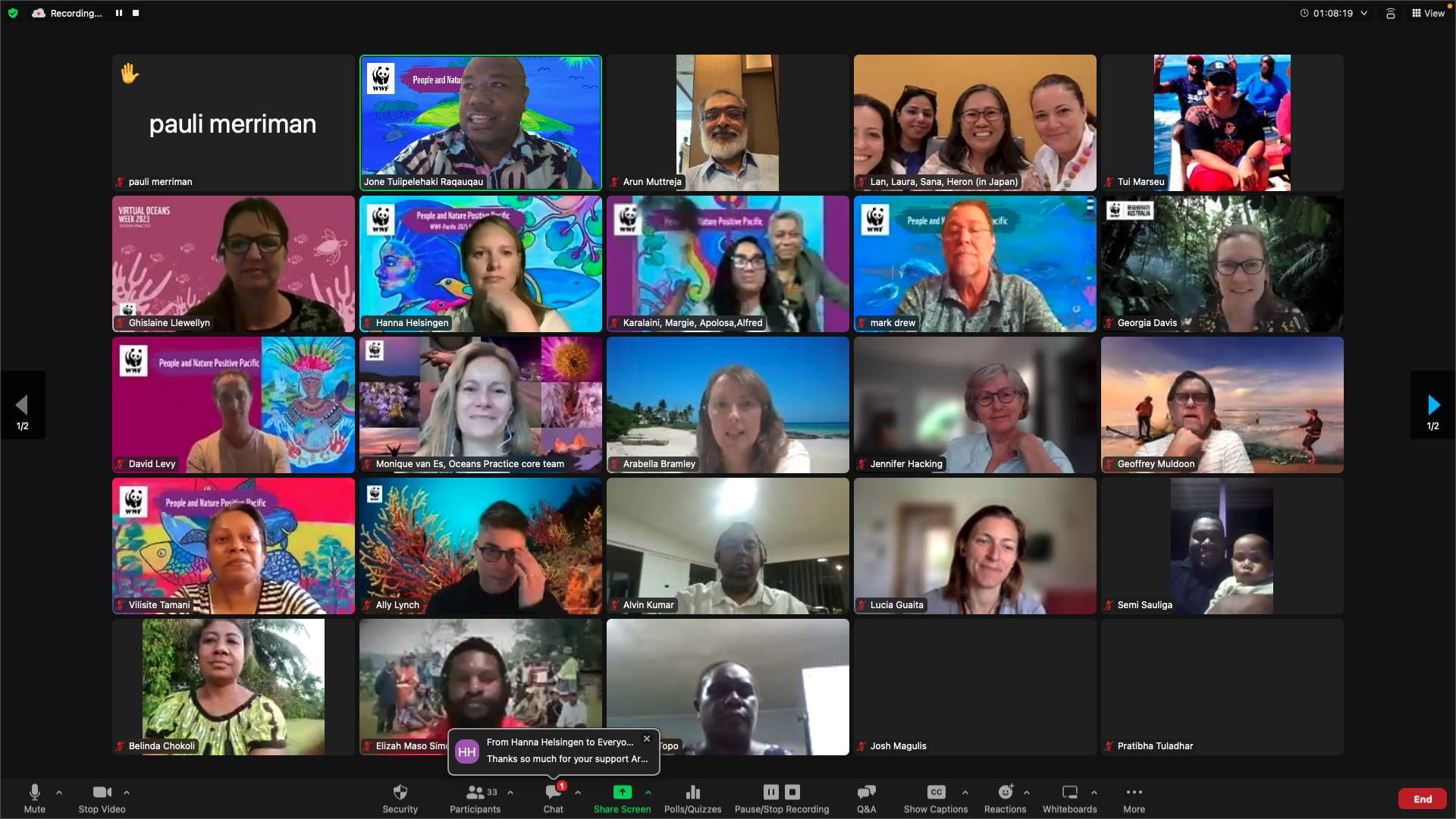The office of the World Wide Fund for Nature in the Pacific (WWF-Pacific) is proud to announce the launch of its revitalised 2025 Strategic Plan. A timely endeavour as the Pacific region faces unprecedented challenges from climate change and biodiversity loss.
This forward-thinking roadmap positions the organisation, with 28 years of experience in the region, at the forefront of addressing these critical issues and fostering a sustainable future for the Pacific and its communities – towards a People and Nature Positive Pacific.
Recognising the vital role of communities as partners, the WWF-Pacifc 2025 Strategic Plan places a strong emphasis on supporting and engaging with local communities in Fiji, Solomon Islands, and Papua New Guinea (PNG). By valuing and integrating traditional knowledge and practices, WWF-Pacific aims to deepen the understanding of the intricate connections between people and nature. This approach links bottom-up conservation models to global policy, creating a harmonious and effective approach to conservation and sustainable development.
The Pacific region, renowned for its unparalleled biodiversity and cultural heritage, faces mounting threats that demand urgent action. Rising sea levels, coral reef degradation, and the intensifying impacts of climate change pose significant risks to both the environment and the well-being of Pacific island nations and its peoples.
The updated Strategic Plan unites diverse thematic areas to create a sustainable future for the Pacific. It strives to protect critical habitats, ensure food security, and safeguard vulnerable species by supporting the 30×30 target, promoting sustainable fisheries and blue foods, and conserving marine species. Additionally, the plan commits to reducing deforestation, advocating for Pacific policy leadership, mainstreaming Gender Equality, Disability and Social Inclusion (GEDSI), and promoting a sustainable blue economy underpin its efforts to drive policy change, foster inclusivity, and enable investments that benefit both people and nature in the region.
The updated and robust Strategic Plan is a response that emphasizes the urgency of the situation and charts a path towards a People and Nature Positiv Pacific. By leveraging partnerships, policy and advocacy, engaging communities, and implementing innovative conservation approaches, WWF-Pacific aims to safeguard the Pacific’s unique ecosystems while ensuring the sustainable development and prosperity of its people.
Climate resilience is a strong emphasis of the plan, recognising it as the single greatest threat to the Pacific and everything we do is a response to the impacts from climate change. By integrating Environment Social Safety Framework (ESSF) and GEDSI principles, WWF-Pacific aims to build climate resilience, enhance adaptive capacities, and promote sustainable practices that empower all members of communities and safeguard their livelihoods.

The integration of ESSF and GEDSI principles ensures that conservation initiatives not only protect and restore the Pacific’s unique ecosystems but also consider the needs and aspirations of local communities, particularly those who are traditionally marginalised or vulnerable, including women, youth, and people with disabilities. By engaging with diverse stakeholders, promoting social inclusivity, and addressing gender disparities, WWF-Pacific aims to create meaningful and lasting change.
“The Pacific region holds tremendous potential to lead on key policy issues that impact our planet’s future”, Director of WWF-Pacific, Mark Drew.
“From Biodiversity Beyond National Jurisdiction (BBNJ) to 30×30 target, a moratorium on deep-sea mining, reducing plastic pollution, and the upcoming COP31, WWF-Pacific is committed to driving these critical discussions in partnership with Pacific Island Countries.”
“We also recognise the importance of community leadership and the inclusive engagement of marginalised groups, advancing an equity and rights-based approach to conservation. By connecting sustainable value chains, indigenous and community enterprises, and fostering sustainable finance and impact investment, we can unlock new opportunities for positive change.”
“We are thrilled to present our revitalised Strategic Plan, which positions WWF-Pacific as a catalyst for change in the Pacific region”, said Drew.
He added, “This plan underscores our commitment – together possible – to working hand in hand with our communities, civil society, the global WWF network, our partner Council of Regional Organisations in the Pacific (CROP) agencies and governments in the Pacific, to address the pressing challenges facing the Pacific and chart a course towards a sustainable future. The only way we will get to a People and Nature Positive Pacific is if we journey together.”
The launch took place through two successful online events that accommodated two different time zones. The events brought together partners from various countries, including Australia, Austria, United States of America, Sweden, Hong Kong, Thailand, Fiji, Solomon Islands and PNG.
Looking forward, WWF-Pacific has its eyes set on 2030, a crucial deadline for the planet and by when a lit of conservation and climate action is needed. There is growing support for protecting and conserving at least 30 percent of our planet by 2030 to halt biodiversity loss and the degradation of important ecosystem services. The organisation is dedicated to moving towards a People and Nature Positive Pacific – where people are more empowered, clmate resilient and prosperous and where nature is thriving and visibly and measurably recovering.
SOURCE: WWF PACIFIC/PACNEWS















